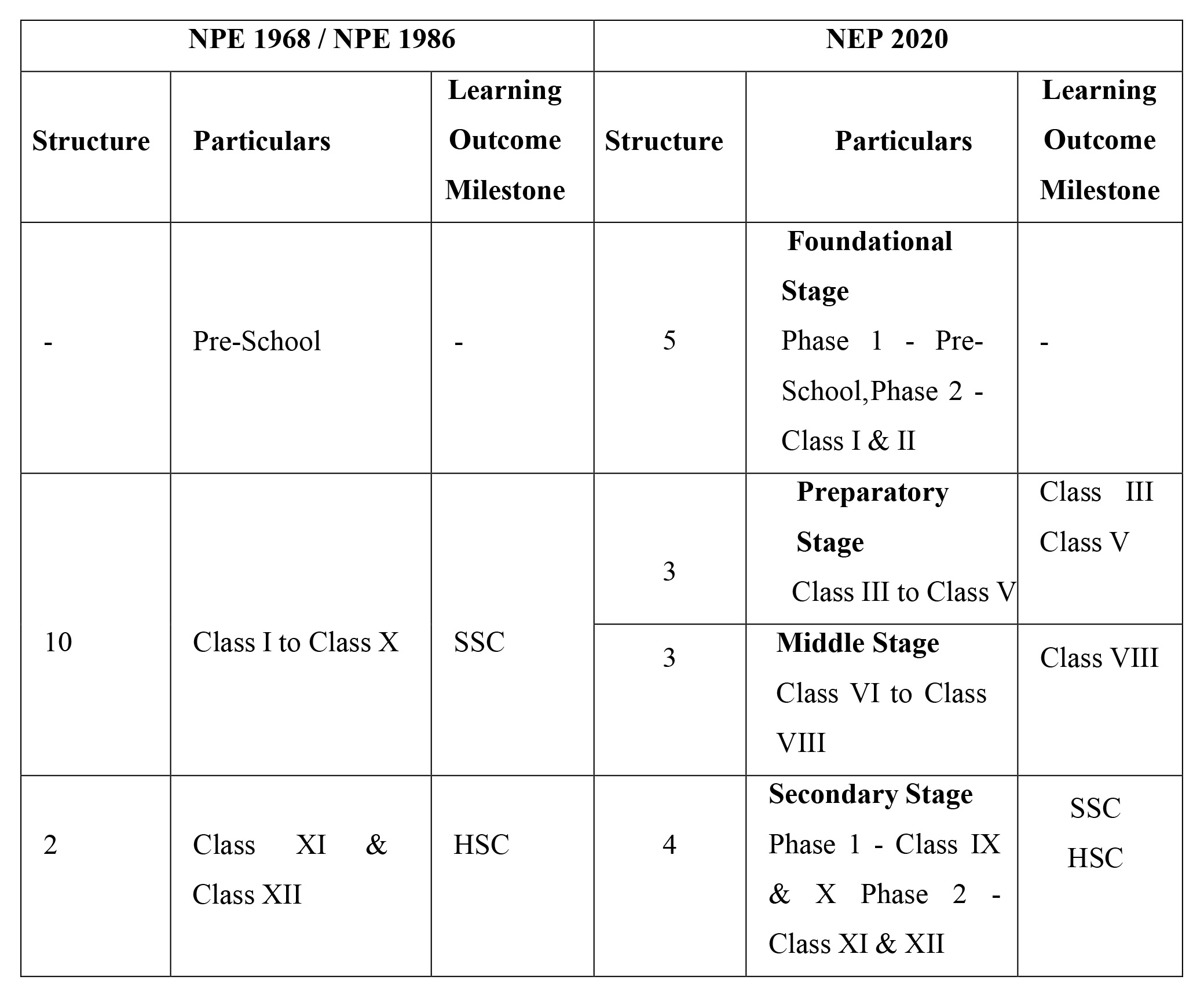NPE 1986 to NEP 2020: Decoding the What, When & How of Indian education policies
Dr. Shrenik BK, Co-Founder, Education Ssabhi Ko

We were celebrating the Green and White revolutions of the late 1960s when the first National Policy on Education (NPE), 1968 was promulgated. Two decades later following the Telecom Revolution came the launch of the National Policy on Education (NPE), 1986. With the strong foundations of NPE 1968 & NPE 1986 backed by persistent efforts from successive Central & state governments, NEP 2020 is all set to bring about comprehensive reform in education for India’s 260 million school going children.
Significantly NEP 2020 recommends a curricular framework for school education guided by a 5 + 3 + 3 + 4 model — replacing the earlier 10+ 2 model — comprising the Foundational (3 years of preschool + Grades I-II), Preparatory (Grades III-V), Middle (Grades VI-VIII), and High school (Grades IX-XII in two phases, i.e. IX and X in the first and XI and XII in the second) stages respectively.
A tabular (comparative) representation shall perhaps make the structure clearer:

Transition Preparedness for Schools based on some key points of NEP is as under:
Physical Infrastructure
Clause 4.3 of the policy document clearly states: “The above-described stages are purely curricular and pedagogical, designed to optimize learning for students based on the cognitive development of children; they will inform the development of National and State curricula and teaching-learning strategies at each stage, but parallel changes to physical infrastructure will not be required.”
This means that states like Maharashtra, Karnataka, Andhra, Telangana, Odisha, Assam, which host a large number of junior / pre-university colleges (for classes XI-XII) — are here to stay. The associated relevance of class X exams will also continue to prevail but will keep evolving from time to time. Therefore there is no specific compulsion to embrace physical infrastructural changes.
National Curriculum Framework (NCF)
Clause 4.30 states that the NCF is aligned to a common curricular framework across India — in school and teacher education. This will bring parity in school syllabuses across the country. Especially schools in the North-East and other remote areas will be free to access the pedagogies and best practices of popular schools / school-chains countrywide. This also means that while there is a common NCF, schools must align with technology-enabled pedagogies with “teachers and faculty at the heart of the learning process” as envisaged in the ‘Core Principles’ of the NEP document.
National Assessment Centre
Clause 4.37 states: “While the Board exams for Grades 10 and 12 will be continued, the existing system of Board and entrance examinations shall be reformed to eliminate the need for undertaking coaching classes.”. A new national assessment centre PARAKH (Performance Assessment, Review, and Analysis of Knowledge for Holistic Development) is expected to formulate common norms, guidelines and standards for assessments / evaluations of students across all boards. Moreover, assessments for class III, V and VIII students will also become the new norm to keep track of their academic progress. Rajasthan, Punjab, MP, Karnataka, Haryana, Himachal Pradesh and Assam are among the early moving states to implement this norm already. Therefore by 2025, all schools countrywide must brace for common annual assessments in class III, V, and VIII apart from board exams in class X and class XII.
CUET by National Testing Agency (NTA)
Clause 4.42 of NEP 2020 mentions that CUET (Common University Entrance Test) will be the common gateway to arts science and commerce higher education institutions after completing class XII just like JEE (Joint Entrance Examination) for admission into engineering colleges and NEET (National Eligibility cum Entrance Test) for admission into medical/dental colleges. The relevance of class XII exams will continue to prevail along-with JEE / NEET / CUET. For instance. a minimum 75 percentage aggregate criteria in class XII recently was set for JEE aspirants of 2023. Schools will have to focus on regular formative assessments & FLN from class III itself, thereby laying a strong foundation & self- preparedness by students within the school ecosystem for competitive exams after completing class XII.
Higher significance of schools than ever before
New-age parents exploring options for enrolling their children in a suitable school should lay greater emphasis on (specific) school-ecosystems rather than the board it is affiliated with as the National Curriculum Framework under NEP advocates a common curriculum for all boards anyways. Continuous evaluation throughout various stages of schooling years (as highlighted above) with emphasis on personalised core-competencies rather than scoring marks by rote-learning is the core theme of NEP 2020. Schools shall continue to have great significance in nation- building & will witness unprecedented innovative pedagogy than ever before.
While Indians have experienced phenomenal transformation in the world outside the four walls of our classrooms from 1968 to 1986 to 2020; chalk-and-talk blackboard pedagogies have largely remained the same. We cannot always build the future for our youth, but we can certainly build our youth for the future. School managements and teachers, let us collectively equip our youth to thrive in a dynamic world.
Also Read: Planning to Study Abroad? Know the importance of diversity and inclusion















Add comment